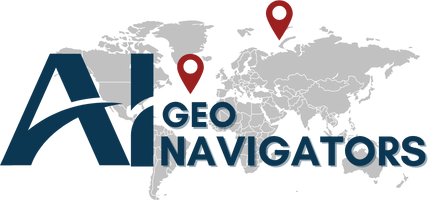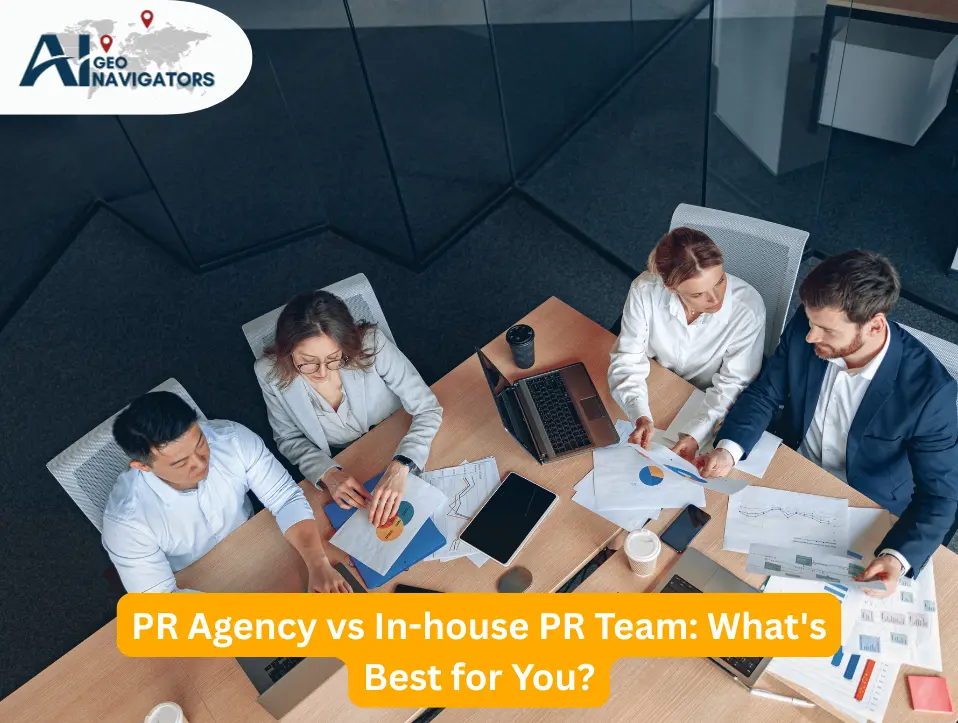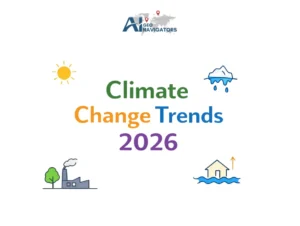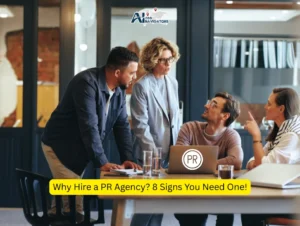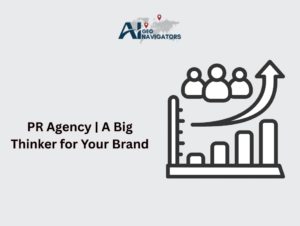Your brand is finally ready to grow. You’ve launched your services, set up your website, posted on social media a few times and now you need people to know who you are.
You need attention, visibility, trust, credibility, and a strong standing in the market.
Suddenly, you’re faced with a decision every company must make at some stage:
Should you build your own in-house PR team, or should you hire a professional PR agency?
On paper, both sound good.
In reality, both come with advantages, but one option is consistently faster, more affordable, more strategic, and more effective for brands trying to grow.
In this article, we break down the differences, explore the pros and cons, explain the hidden costs, and help you understand which path is right for your business.
Table of Contents
ToggleWhat is a PR Agency?
A PR agency is an external company that specializes in providing PR services to multiple clients. They bring a team of experts, established media connections, and industry knowledge to manage your brand’s public image.
Advantages of Hiring a PR Agency
- Access to Expertise
PR agencies employ professionals with diverse skills, including media relations, crisis management, content creation, SEO, digital marketing, and event planning. - Established Media Relationships
Agencies already have relationships with journalists, bloggers, and influencers, making it easier to secure press coverage. - Scalability
Agencies can scale resources up or down based on campaign requirements, seasonal demands, or company growth. - Fresh Perspective
Agencies bring an external viewpoint, offering creative ideas, strategic insights, and industry benchmarks that in-house teams may overlook. - Cost Efficiency for Short-Term Needs
For short campaigns or specific projects, agencies can be more cost-effective than hiring a full-time in-house team.
Challenges of Hiring a PR Agency
- Less Control
Outsourcing PR means you have to rely on an external team, which can limit immediate control over messaging and campaign execution. - Potential Communication Gaps
Misunderstandings or delays in communication can occur if the agency is not fully aligned with your brand vision. - Learning Curve
Agencies need time to fully understand your business, products, and culture before executing effective PR strategies. - Cost for Long-Term Engagements
High-quality agencies can be expensive, and long-term contracts may become a significant budget consideration.
Key Differences Between PR Agencies and In-House PR Teams
| Feature | In-House PR Team | PR Agency |
| Cost | High fixed cost (salaries, benefits) | Variable cost (project-based or retainer fees) |
| Expertise | Limited to team skills | Broad expertise across industries and skills |
| Control | High control over messaging | Medium to low; agency may handle execution independently |
| Speed | Immediate responses possible | May have delays due to coordination and approvals |
| Innovation | Limited by internal perspective | High innovation with external ideas and trends |
| Scalability | Hard to scale quickly | Easy to scale resources based on needs |
| Brand Knowledge | Deep internal understanding | Requires onboarding and continuous communication |
Factors to Consider When Choosing Between PR Agency and In-House Team
1. Budget
Budget is often the decisive factor. Startups and small businesses with limited resources might find hiring a full-time in-house team challenging. A PR agency can offer flexibility and cost-efficiency, especially for short-term campaigns.
2. Company Size
Large companies may benefit from having a dedicated in-house PR team to maintain consistent communication and control. Small to medium-sized businesses often rely on agencies to access specialized expertise without the overhead of full-time staff.
3. Campaign Complexity
For complex PR campaigns involving media tours, influencer collaborations, or crisis management, agencies usually have the experience and connections necessary to deliver results efficiently.
4. Industry Knowledge
If your business operates in a niche industry, an agency with specific experience in that sector can provide insights and contacts that an in-house team may lack.
5. Long-Term vs Short-Term Goals
- Long-Term Goals: Building a strong, consistent brand identity often benefits from an in-house team.
- Short-Term Goals: Launching a new product or running a media campaign can be more effective with an agency expertise.
6. Control and Culture Fit
If maintaining tight control over messaging is essential, an in-house team is ideal. Agencies work well when collaboration and trust are established, but there may always be a slight gap in cultural alignment.
When an In-House PR Team is Ideal
An in-house PR team is often the best choice for businesses that:
- Have ongoing PR needs and multiple projects throughout the year.
- Require immediate responses to media inquiries or crises.
- Prioritize alignment with internal culture, mission, and values.
- Want to build deep internal expertise and knowledge over time.
- Have a budget that supports salaries, training, and PR infrastructure.
Example: A global tech company with multiple product launches, internal communications, and corporate social responsibility (CSR) initiatives may benefit from an in-house PR team to maintain consistency and control.
When a PR Agency is Ideal
Hiring a PR agency is ideal for businesses that:
- Have specific projects or campaigns requiring specialized skills.
- Need access to media relationships and influencer networks.
- Want creative, outside-the-box strategies.
- Prefer flexibility and scalability without the commitment of full-time staff.
- Operate in a competitive market where innovative campaigns can make a difference.
Example: A startup launching a new app globally may hire a PR agency to create buzz, connect with journalists, and manage influencer campaigns without the overhead of an in-house team.
Conclusion: Which One Should You Choose?
There is no one-size-fits-all answer to whether a PR agency or in-house PR team is better. The decision depends on your company size, budget, PR needs, and long-term goals.
- In-house PR team: Ideal for companies seeking control, deep brand alignment, and long-term strategic consistency.
- PR agency: Best for businesses needing specialized expertise, media access, flexibility, and creative campaigns.
- Hybrid approach: Offers a balance of internal brand knowledge with external expertise and scalability.
Ultimately, the best choice is the one that aligns with your business objectives, resources, and growth strategy. The key is to ensure your PR efforts whether in-house, agency-led, or hybrid are strategic, consistent, and capable of enhancing your brand reputation in a competitive market.
